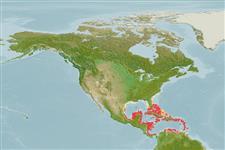>
Blenniiformes (Blennies) >
Dactyloscopidae (Sand stargazers)
Etymology: Platygillellus: Greek, platys = flat + Theodore Nicolas Gill (1837-1914) researcher of abyssal fishes and systematics (Ref. 45335).
Environment: milieu / climate zone / depth range / distribution range
Ecologia
marinhas associadas(os) a recifes; intervalo de profundidade 0 - 30 m (Ref. 27742). Tropical; - 9°N
Western Atlantic: southern Florida, USA and Bahamas to Panama.
Tamanho / Peso / Idade
Maturity: Lm ? range ? - ? cm
Max length : 6.4 cm TL macho/indeterminado; (Ref. 7251)
Descrição breve
Morfologia | Morfometria
Espinhos dorsais (total): 16 - 17; Raios dorsais moles (total): 15-16; Espinhos anais 2; Raios anais moles: 25 - 26. Pale tan or white with 4 broad reddish-brown bands on side between nape and caudal fin base. Dorsal and caudal fin rays have dark spots. 3 spines in dorsal finlet (Ref. 26938).
Inhabits sand and rubble areas around coral reefs or exposed rocks. Absent from surf beaches (Ref. 27742). The reddish-brown bands along the sides of the fish serve as camouflage when the fish partially buries itself in sand (Ref. 26938).
Life cycle and mating behavior
Maturidade | Reprodução | Desova | Ovos | Fecundidade | Larvas
Dawson, C.E., 1982. Atlantic sand stargazers (Pisces: Dactyloscopidae), with description of one new genus and seven new species. Bull. Mar. Sci. 32(1):14-85. (Ref. 27742)
Categoria na Lista Vermelha da IUCN (Ref. 130435)
Ameaça para o homem
Harmless
Utilização humana
Mais informação
Nomes comunsSinónimosMetabolismoPredadoresEcotoxicologiaReproduçãoMaturidadeDesovaAgregação para desovaFecundidadeOvosDesenvolvimento dos ovos
Idade/TamanhoCrescimentoComprimento-pesoComprimento-comprimentoFrequência de comprimentoMorfometriaMorfologiaLarvasDinâmica larvarRecrutamentoAbundânciaBRUVS
ReferênciasAquaculturaPerfil para aquaculturaEstirpesGenéticaElectrophoresesHereditariedadeDoençasProcessamentoNutrientsMass conversion
Ferramentas
Relatórios especiais
Descarregue XML
Fontes da internet
Estimates based on models
Preferred temperature (Ref.
123201): 26.4 - 28.2, mean 27.5 °C (based on 518 cells).
Phylogenetic diversity index (Ref.
82804): PD
50 = 0.5156 [Uniqueness, from 0.5 = low to 2.0 = high].
Bayesian length-weight: a=0.01000 (0.00244 - 0.04107), b=3.04 (2.81 - 3.27), in cm total length, based on all LWR estimates for this body shape (Ref.
93245).
Nível Trófico (Ref.
69278): 4.3 ±0.6 se; based on size and trophs of closest relatives
Fishing Vulnerability (Ref.
59153): Low vulnerability (10 of 100).
Nutrients (Ref.
124155): Calcium = 161 [74, 268] mg/100g; Iron = 0.781 [0.441, 1.364] mg/100g; Protein = 18.1 [17.0, 19.2] %; Omega3 = 0.106 [0.056, 0.196] g/100g; Selenium = 23.1 [9.4, 51.8] μg/100g; VitaminA = 213 [64, 717] μg/100g; Zinc = 2.4 [1.6, 3.5] mg/100g (wet weight);
